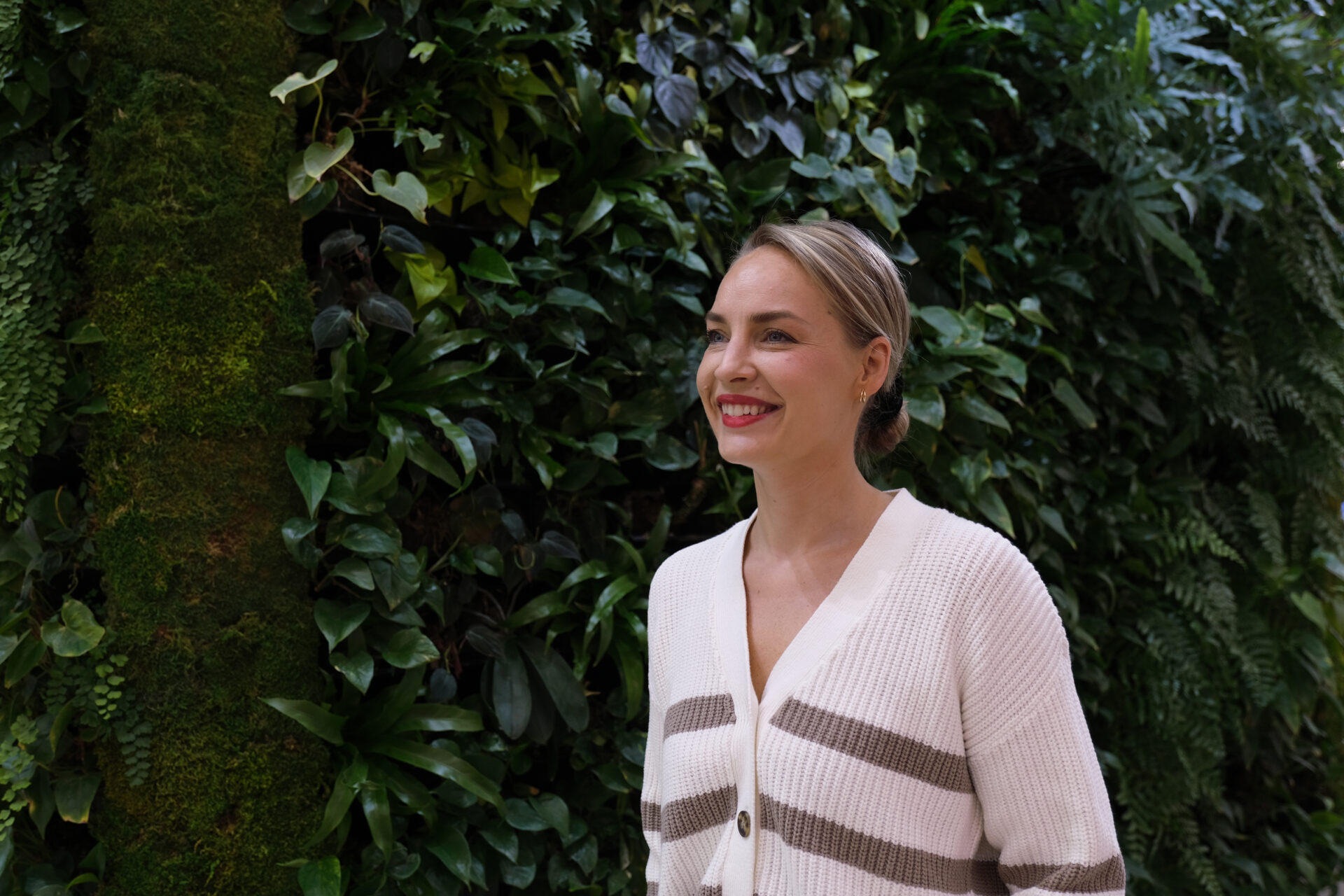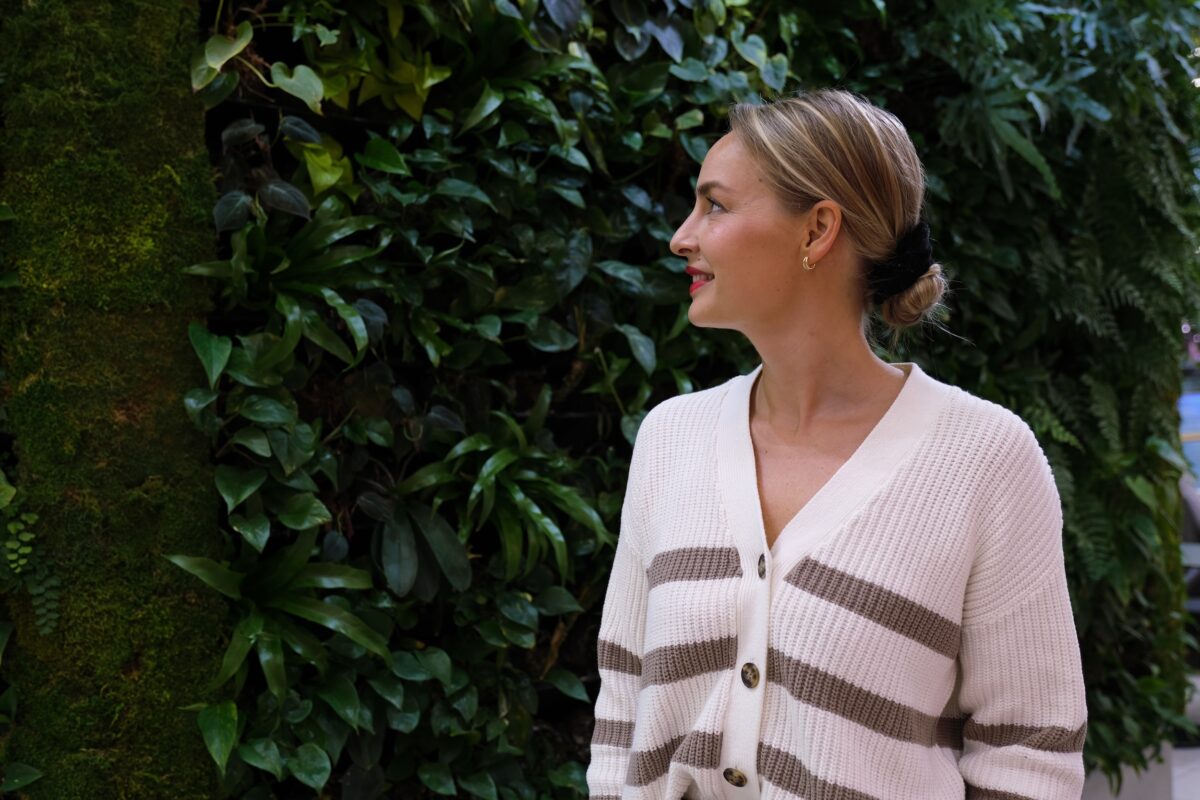Our website uses cookies. We analyze usage statistics collected based on them and they may be used for targeting advertising on other websites.
You can also reject the tracking and use of cookies. More information

Abundance, eesponsibility, and ease. InnoGreen’s green designer Leena Kinnunen tells about her leap into the world of greenery and sales and what is currently expected from green interior design.
Having studied design, Kinnunen built a career as an interior designer. The pandemic prompted her to reconsider the direction of her career and the work-life balance. She aspired to find a fulfilling job that could be balanced with family life. Now, after a year at InnoGreen, Kinnunen describes her decision as “the best ever.”
“InnoGreen has been exactly what I imagined and more,” Kinnunen begins. “They take care of their employees, everyone is on the same page. We respect and help each other, and there is genuinely a great atmosphere.”
In addition to a positive work culture, Kinnunen highlights the importance of responsibility. InnoGreen takes concrete actions for a more sustainable green industry, such as discontinuing the sale of silk plants. While silk plants are still used in challenging conditions in the green industry, InnoGreen stopped selling silk plants in early 2023.
“Giving up silk plants was a really fantastic thing. It’s courageous to take the first step in the direction the entire industry should go and, at the same time, take the financial risk that silk plant buyers might go elsewhere. I think it shows that InnoGreen genuinely stands behind its values. When the goal is to be more responsible, it requires actions like these.”
As a green designer, Kinnunen works as part of the sales team, and about half of her clients are interior architects and interior designers.
“I speak the language of designers, so to speak. I understand our clients’ perspective, can read floor plans quickly, and grasp the goals and wishes of the client. Collaboration is pleasant and easy when there is a common understanding.”
Kinnunen feels that a strong sales team consists of professionals with diverse backgrounds. While Kinnunen comes from the world of interior architecture, she finds it extremely rewarding to work with colleagues who have a longer career in the green industry. “We can learn from each other and bring different expertise to the implementations. This way, we can serve our clients in a very versatile manner. Even though the client mainly deals with me, they have the expertise of the entire staff at their disposal.”
In her work, Kinnunen meets clients, visits spaces, creates plans on the computer, and occasionally puts her hands into the soil. Kinnunen says that as a designer, it’s crucial to see the entire service process and understand how her plan on paper becomes a reality in the hands of plant installers.
“It is extremely valuable to see the work of our installers and plant care team. A successful implementation requires thoroughness from each of us, and I greatly appreciate the expertise of every InnoGreen employee. It’s eye-opening when I get to create moss panels, plant, and deliver plants to clients’ spaces myself. In my work, I get to see the whole picture and understand what we sell and how long each phase takes. We don’t just sell plants; we sell a service package and green experiences. Every detail must be taken into account.”

Work has changed. Many companies have adopted a hybrid model, and the use of office spaces has evolved. The importance of the comfort of office spaces has increased, and spaces need to support collaboration and creativity.
Kinnunen explains that currently, green interior design is expected to provide jungle-like abundance. Moss and large-leaved plants, in particular, are popular. Sustainability is also discussed more, and that’s why InnoGreen’s domestic Birch products are in high demand.
Kinnunen predicts that the significance of green interior design will only grow in the future, and the reason is simple: an inviting space attracts people, whether it’s a workplace, shopping center, restaurant, or store. A professional green design plan, which considers the budget, desires, and space, serves as the starting point for successful green interior design.
“Good green interior design reflects the space and its users. Green design is essential because plants are part of the decor. They significantly affect the atmosphere, comfort, and also communicate about the company,” Kinnunen says. “Green design is the key to sustainable greenery. One must consider the space conditions, choose suitable pots and other solutions for the space, and, of course, select the right plants in terms of species and size. In pots with several different plants, the importance of plant choices is emphasized as the plants should both look good together and be compatible.”
Green interior design is also expected to be easy, and therefore, more people are hoping for a complete package including everything from design to maintenance. Traditionally, lush greenery has required a larger initial investment and made it challenging for some companies to acquire greenery. The tightened economic situation also makes new investments more challenging. That’s why all of InnoGreen’s indoor and outdoor products are now available as a flexible service.
The monthly rental service does not require significant initial investments or a long commitment. The service includes design, products, plants, installation, maintenance, and at the end of the rental period, the removal of all items. Enjoying greenery is now easier than ever.
“Many companies are now in constant change, and office spaces may change too. That’s why greenery as a service is an easy option. It scales according to need, and after an office move, there won’t be poorly maintained potted plants lying around,” says Kinnunen. “With the flexible monthly service, impressive, responsible, and welcoming greenery is available to an increasing number of people.”
